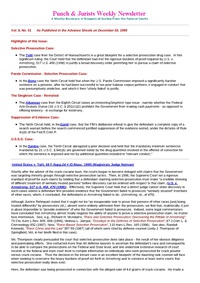In this case the plaintiff, who had been trained as an inmate law clerk by his prison, was punished for sending a letter giving legal advice to another inmate who had been charged with assaulting a prison guard. He was given 10 days detention and he received three "reclassification" …
In this case the Ninth Circuit held that the Government violated Rule 41(d) of the Fed.R.Crim.P. by failing to present the defendant with a complete copy of the warrant at the outset of the search of her apartment; that the violation was deliberate; and that the appropriate remedy was …
Here the Court held that when the Parole Commission imposed a significantly harser sentence on a prisoner, after he had been successful in two prior habeas proceedings, it engaged in conduct that was presumptively vidictive.
In 1984, as part of the Sentencing Reform Act, Congress decreed that the …
In this case the defendant sought a downward departure at sentencing in her drug case based on a claim of abuse and coercion by her common law husband. She argued that she was an "apprehensive caretaker" for her common law husband after he fled the country, and that his …
Shortly after the advent of the crack-cocaine laws, the courts began to become deluged with claims that the Government was targeting minority groups through selective prosecution tactics. Then, in 1996, the Supreme Court set a rigorous standard of proof for such claims by holding that a defendant claiming selective …
Here the Court held that a prior sentence, committed when the defendant was 17 years old, was a "prior sentence" for purposes of the Guidelines, even though the court had suspended imposition of the sentence and imposed probation.
The defendant pled guilty to two counts of possessiong crack …
QUOTE OF THE WEEK - Some comments on the evils of bartered testimony.
"One of the basics of our jurisprudence is the search for truth, and by this is meant not the purchased truth, the bartered-for truth, but the unvarnished truth that comes from the lips of a man …
Here the Court upheld as constitutional the same provisions of the Child Protection Pornography Act which the Ninth Circuit, in Free Speech Coalition v. Reno, (9th Cir. 1999) had held were unconstitutional.
See also U.S. v. Hilton, 167 F.3d 61 (1st Cir. 1999), which also held that the …
Here the Court held that certain provisions of the Child Pornography Act were unconstitutional on First Amendment grounds - a decision that is at odds with previous decisions in both the First and Eleventh Circuits.
In this case, the Ninth Circuit held that certain provisions of the Child …
In this amended decision the Court upheld the suppression of evidence and ruled that the provisions of Rule 41(b) were violated when the FBI, executing a warrant, refused to show the warrant to the victim of the search when it was requested.
In this case the Ninth Circuit …
See also In Re McBryde, 117 F.3d 208 (5th Cir. 1997).
This is another case in which the Fifth Circuit held that the much embattled Judge John H. McBryde committed reversible error when he failed to recuse himself from the defendant's case.
In this case the defendant appealed, arguing that the district court erred in applying the § 2K2.2(b)(5) enhancement because he did not commit another felony offense and there was insufficient evidence that he intended to commit another felony offense. (The defendant did not, however, raise the issue at sentencing, …
The Court's primary reasoning for rejecting the defendant's arguments in this case was that Congress has enacted a number of statutes authorizing and encouraging the U.S., in its capacity as prosecutor, to offer leniency and immunity in return for testimony (id., at 195), citing specifically 18 U.S.C. § 3553(e) …
In this case the Eleventh Circuit joined a minority of Circuits in holding that the grouping of fraud and money laundering counts is appropriate under U.S.S.G. § 3D1.2(d), listing cases on both sides of the issue.
Here, the Court agreed that the mere listing of particular guidelines as …
The Federal Anti-Gratuity Statute (18.U.S.C. § 201(c)(2)) is once again making legal news. That statute raised a furor in 1998 when a panel from the Tenth Circuit held that testimony of a cooperating witness should have been suppressed because promises of leniency made to him, in exchange for his …
We also reported this case in connection with another issue, namely the Tenth Circuit’s far-reaching holding that specific references in an indictment to statutes that set forth a sentencing cap do not bar the sentencing court from imposing a greater sentence than what the indictment calls for.
The Court …
United States v. Jones, 194 F.3d 1178 (10th Cir. 1999) (Judge Lucero)
United States v. Santos, 195 F.3d 549 (10th Cir. 1999) (Judge Tacha)
Both of these cases deal with the latest expansion of one of the most untenable fictions of America’s drug laws, namely that the “quantity” of …
In this case the Court upheld the suppression of evidence and ruled that the Fourth Amendment was violated when the police executing a warrant refused to show the warrant and affidavit to the victim of the search when it was requested.
In this case it was undisputed that …
